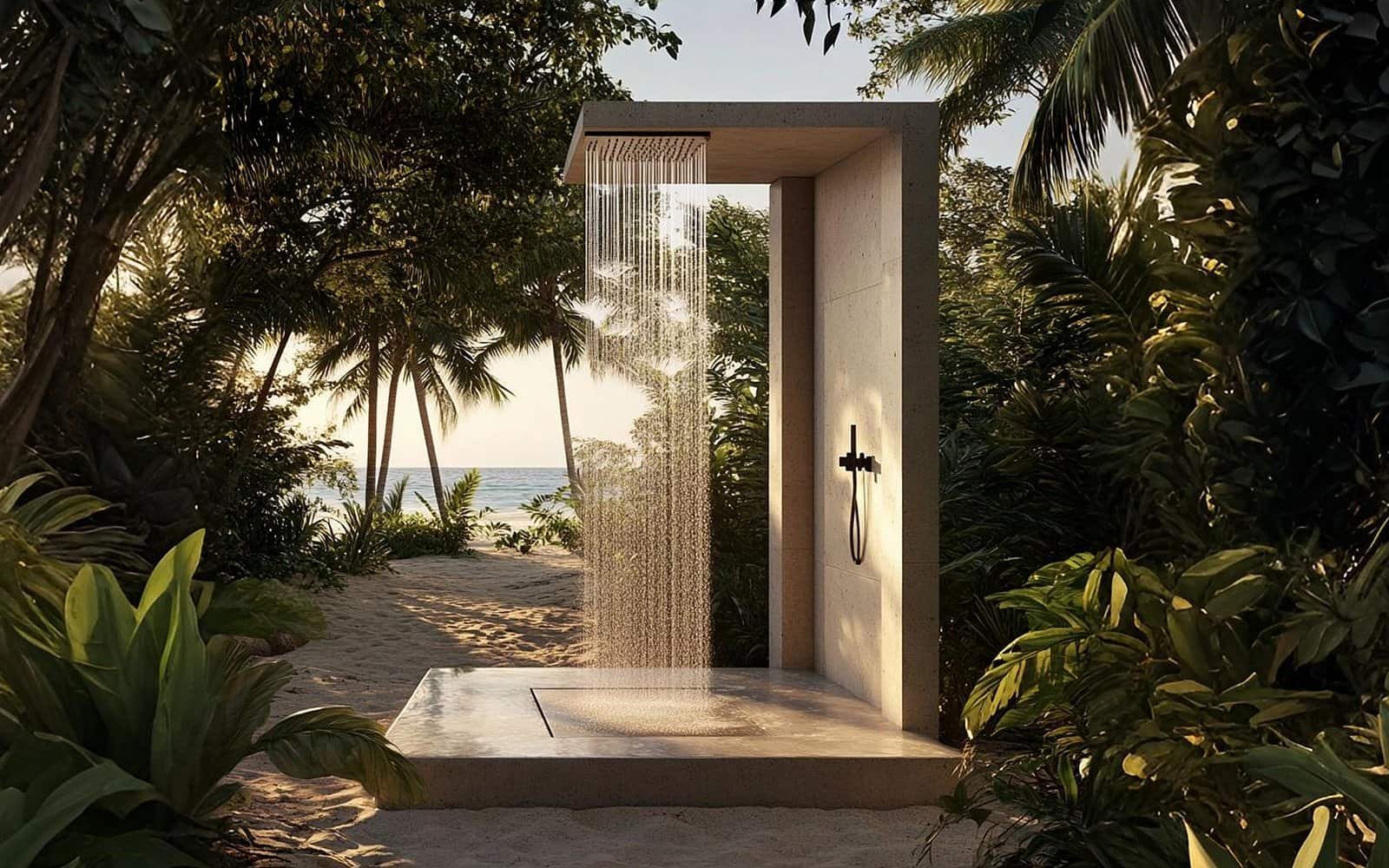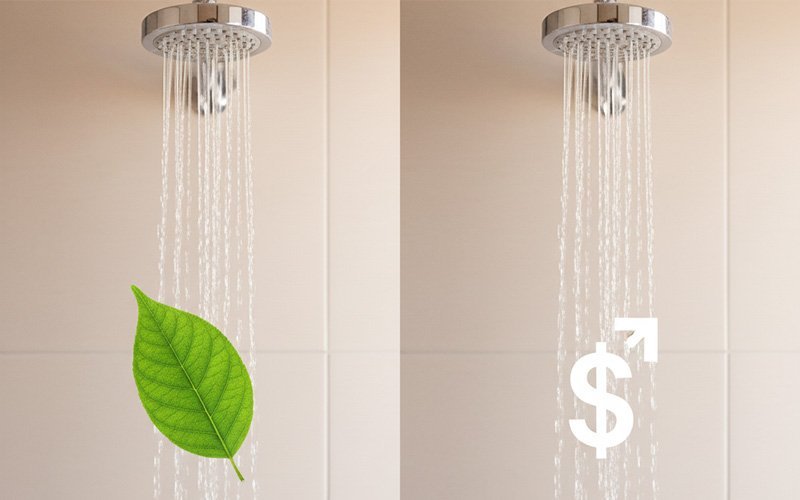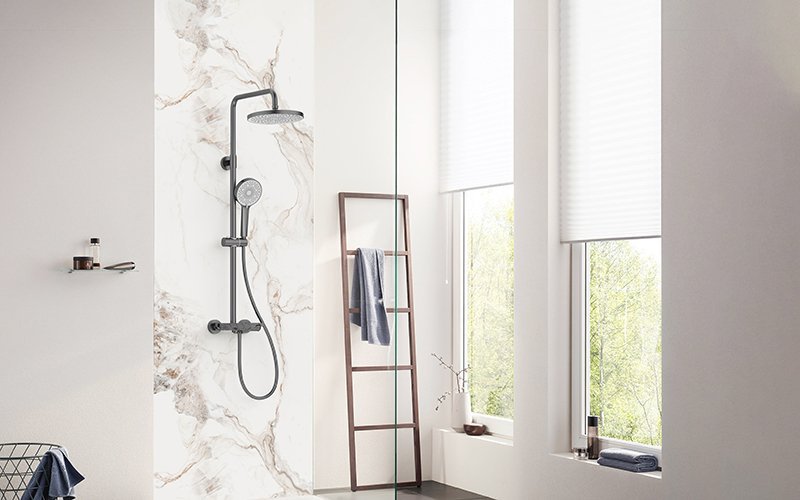Table of Content

DIY Maintenance Disclaimer:
This guide is for general informational purposes only. Maintenance tasks, especially winterization, can be complex and carry the risk of property damage (e.g., burst pipes) if done incorrectly.
The steps provided are to be followed at your own risk. We assume no liability for any damages resulting from the use of this guide. We strongly recommend consulting a licensed plumber for complex tasks like winterizing your plumbing.
Outdoor shower systems offer comfort and convenience but are constantly exposed to sunlight, moisture, salt, wind, and cold. Whether installed at a private home or a commercial site like a beach resort or gym, proper maintenance ensures longevity and performance.
This guide covers all types of outdoor showers (wall-mounted, freestanding, solar, and portable), with practical tips tailored to different climates and materials.
Why Install an Outdoor Shower System?
Outdoor showers offer both practical and aesthetic benefits.
- Rinse Off Dirt or Sand: Convenient for homes near beaches, pools, or gardens.
- Increase Property Appeal: Adds a modern, spa-like aesthetic that can enhance the appeal of a property.
- Improve Hygiene: Useful for rinsing after workouts, yard work, or before using a pool.
- Support Water Efficiency: Many systems can be configured with solar heating and low-flow heads.
- Enhance Guest Experience: A popular feature for vacation homes, resorts, or campsites.
- Protect Indoor Bathrooms: Helps keep mud, chemicals, and sand outside.
How to Choose the Best Location for Your Outdoor Shower
Choosing the right installation spot is crucial for functionality, drainage, and privacy.
- Water Source Proximity
Locate near existing plumbing lines to reduce installation costs. - Drainage
Ensure the ground slopes naturally or has a drainage system to prevent pooling or erosion. - Sun Exposure
Choose sunny areas for solar showers or shaded spots to reduce UV wear on materials. - Privacy
Install near fences, walls, or use privacy screens or plants for visual protection. - Wind Protection
Avoid exposed, windy corners to ensure comfort and prevent cold drafts. - Structural Support
For wall-mounted systems, ensure the wall can support water lines and weight; for freestanding systems, check that the ground is firm and stable. - Accessibility
Place it near high-use areas like pools, backdoors, or patios for convenience.
Types of Outdoor Showers & Their Maintenance Focus
Wall-Mounted Showers

- Setup: Fixed to an exterior wall, connected to indoor plumbing.
- Advantages: Easy hot/cold water access, durable.
- Key Maintenance Tips:
- Seal pipe entry points through walls to prevent leakage.
- In cold regions, insulate exposed pipes or use frost-proof valves.
Freestanding Showers
- Setup: Stand-alone units anchored to the ground or concrete base.
- Advantages: Flexible placement, aesthetic appeal.
- Key Maintenance Tips:
- Check base and mounting bolts regularly for stability.
- Apply anti-rust coating to exposed metal surfaces.
Solar Showers
- Structure: Solar-heated tank, often used near pools or campgrounds.
- Advantages: Eco-friendly, self-heating.
- Key Maintenance Tips:
- Clean solar panels regularly for efficiency.
- Drain the tank after use to prevent bacterial growth.
- Apply UV protectant spray on plastic components.
Portable Showers
- Forms: Water bag, battery pump, or gravity-fed units.
- Advantages: Lightweight, mobile.
- Key Maintenance Tips:
- Rinse thoroughly after each use and let dry.
- Store indoors to avoid mildew or UV damage.
Daily & Weekly Cleaning Tips
Weekly Rinsing & Surface Cleaning
- Hose down the entire shower area to remove soap, algae, and dirt.
- Use a soft brush and mild detergent (like dish soap).
- Avoid abrasive sponges or strong chemicals that damage finishes.
Descaling Showerheads
- Showerheads may clog due to hard water minerals or salt.
- Soak in white vinegar for a few hours and scrub with a toothbrush.
- Use a baking soda paste to remove stubborn residue.
Leak & Fitting Checks
- Monthly inspection of pipe joints, showerheads, and valves for leaks.
- Re-tighten connections and apply new plumber’s tape if needed.
- Replace worn-out washers or O-rings.
Surface & Metal Protection
- Reapply waterproof sealant on tile or stone joints annually.
- Treat wood surfaces with protective oil or wax to prevent cracking.
- Polish metal parts with stainless-steel protectant or car wax to prevent corrosion.
Accessory Storage
- Store handheld showers, hoses, towels, and brushes indoors after use.
- Cover exposed parts with waterproof or insulated covers to reduce UV and frost damage.
Plumbing & Drainage System Care
Drainage Maintenance
- Remove leaves, hair, and debris from the drain weekly.
- Pour a mix of baking soda + vinegar, then flush with hot water monthly.
- Use eco-safe enzyme cleaners for internal buildup.
- In sandy areas, install a gravel base or dry well to improve drainage.
Winterization (For Cold Regions)
- Shut off the outdoor water supply before winter.
- Open outdoor faucets and drain remaining water.
- Use compressed air to blow out water lines (optional).
- Wrap exposed pipes with insulation tape or foam.
- Store shower components indoors or cover the system with a weatherproof cover.
Residential vs Commercial Shower Maintenance
Residential Use
- DIY cleaning and seasonal checkups are often sufficient.
- Use durable materials like stainless steel or copper with basic UV/rust protection.
- Schedule a professional inspection once a year.
Commercial Use
- Frequent use requires strict inspection schedules.
- Use marine-grade materials (e.g., 316 stainless steel) for higher corrosion resistance.
- Install ADA-compliant fixtures and follow local plumbing codes.
- Consider a professional maintenance contract.
Maintenance by Climate
Coastal Areas
- Salt air corrodes metal quickly – rinse with fresh water after each use.
- Clean weekly with soapy water to prevent salt deposits.
- Brush off sand regularly to avoid scratches.
- Components made from 316L stainless steel or solid brass are often chosen for their high corrosion resistance in these environments.
- Apply metal polish or automotive wax for extra protection.
Hot, Dry Regions
- UV exposure causes plastic to crack and rubber gaskets to harden.
- Use UV-resistant materials (e.g., UV-stable PVC).
- Spray UV protectant periodically.
- Use a squeegee to dry surfaces to prevent mildew.
Humid & Tropical Climates
- High humidity fosters mold and musty smells.
- Ensure proper ventilation and use fast-drying materials.
- Spray wood or walls with anti-mold solutions monthly.
Conclusion
Maintaining an outdoor shower isn’t complicated—but it requires consistency, awareness of local conditions, and choosing the right materials. Whether you’re a homeowner looking to enjoy a backyard rinse or a property manager overseeing a beachside facility, following this guide will help you.
FAQs
Related Posts








